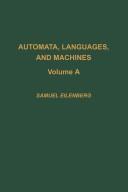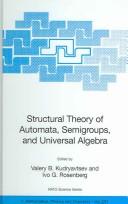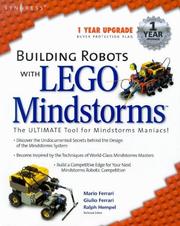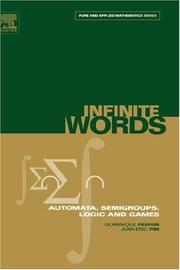| Listing 1 - 10 of 42 | << page >> |
Sort by
|
Book
Year: 2020 Publisher: Neuchâtel Editions Alphil Presses universitaires suisses
Abstract | Keywords | Export | Availability | Bookmark
 Loading...
Loading...Choose an application
- Reference Manager
- EndNote
- RefWorks (Direct export to RefWorks)
Les Jaquet-Droz et Leschot occupent une place de choix dans la mémoire collective neuchâteloise. L’histoire mythifiée des trois mécaniciens chaux-de-fonniers – Pierre Jaquet-Droz, son fils Henry-Louis et leur ami et collaborateur Jean-Frédéric Leschot – participe encore aujourd’hui à la définition du savoir-faire horloger comme une aptitude technique propre à l’Arc jurassien. Alors que tant a été écrit sur ces horlogers du XVIIIe siècle, éminents s’il en est, deux enjeux balisent le présent travail : renouveler le regard porté sur ce trio mécanicien et analyser les sphères d’activités qui caractérisent leurs parcours. De la figure du génie mécanique montagnard à l’image d’Épinal de l’horloger, acteurs isolés au sein d’un contexte idéalisé et non problématisé, les Jaquet-Droz et Leschot envahissent tous les champs de l’histoire en devenant les figures tutélaires de l’horlogerie neuchâteloise. Au sein de cette composition historiographique, les automates occupent une place prépondérante. Déjà au XVIIIe siècle, les enjeux dont ils sont les porte-paroles motivent des commentaires aux orientations diverses : elles ont trait au domaine technique et commercial, à la sphère philosophique et au champ épistémologique. Forte d’une réputation technique fondée sur les automates notamment, la maison Jaquet-Droz prospère et se développe en ouvrant des ateliers à Londres puis à Genève. Ceux-ci deviennent des acteurs importants de la production de mécaniques de luxes où sous-traitance et adaptabilité sont les mots-clés qui permettent de se faire un nom sur la place, quitte à l’effacer de ses propres pièces pour favoriser la vente de la marchandise. À l’image de la production, la vente se réalise sur l’échelle internationale pour toucher, notamment, un marché riche en symboles : la Chine. Pour survivre, notamment en situation de crise, la maison doit aussi adapter son écoulement et laisse ainsi entrevoir les stratégies nécessaires à mettre en œuvre pour s’implanter durablement dans le commerce international. Une polyphonie de définitions permet de mieux circonscrire le rôle et la place de l’horloger au XVIIIe siècle, à l’aune d’activités qui dépassent le seul intérêt économique. À travers la fabrication de prothèses anatomiques ou la participation aux activités de la Société des Arts de Genève, la mécanique devient un outil mis au service de la collectivité et vient ainsi contrecarrer les propos parfois réducteurs émis au sujet de l’inutilité des automates. À travers un corpus forcément à géométrie variable qui donne une image plus nuancée du parcours des trois hommes, cette étude souhaite replacer les Jaquet-Droz et Leschot dans le contexte qui est leur et évoquer les enjeux multiples qu’ils rendent visibles.
horlogerie --- automates --- luxe --- Chine --- commerce --- sous-traitance --- réseaux --- mobilité
Book
ISBN: 9780521515979 0521515971 9780511777653 9781139648721 1139648721 0511777655 9781139636025 1139636022 9781139641111 1139641115 9781139638272 1139638270 1139886622 9781139886628 1139635271 9781139635271 113964775X Year: 2010 Volume: 135 Publisher: Cambridge New York Cambridge University Press
Abstract | Keywords | Export | Availability | Bookmark
 Loading...
Loading...Choose an application
- Reference Manager
- EndNote
- RefWorks (Direct export to RefWorks)
This collaborative volume presents trends arising from the fruitful interaction between the themes of combinatorics on words, automata and formal language theory, and number theory. Presenting several important tools and concepts, the authors also reveal some of the exciting and important relationships that exist between these different fields. Topics include numeration systems, word complexity function, morphic words, Rauzy tilings and substitutive dynamical systems, Bratelli diagrams, frequencies and ergodicity, Diophantine approximation and transcendence, asymptotic properties of digital functions, decidability issues for D0L systems, matrix products and joint spectral radius. Topics are presented in a way that links them to the three main themes, but also extends them to dynamical systems and ergodic theory, fractals, tilings and spectral properties of matrices. Graduate students, research mathematicians and computer scientists working in combinatorics, theory of computation, number theory, symbolic dynamics, fractals, tilings and stringology will find much of interest in this book.
Combinatorial analysis --- Number theory --- Machine theory --- Analyse combinatoire --- Théorie des nombres --- Automates mathématiques, Théorie des --- Number Theory --- Combinatorial analysis. --- Machine theory. --- Number theory. --- Analyse combinatoire. --- Nombres, Théorie des. --- Automates mathématiques, Théorie des. --- Combinatorische analyse --- Computer science --- Dynamics (symbolic) --- Informatica --- Informatique --- Symbolic dynamics --- Théorie des nombres --- Automates mathématiques, Théorie des --- Abstract automata --- Abstract machines --- Automata --- Mathematical machine theory --- Algorithms --- Logic, Symbolic and mathematical --- Recursive functions --- Robotics --- Number study --- Numbers, Theory of --- Algebra --- Combinatorics --- Mathematical analysis --- Théorie des automates mathématiques
Book
ISBN: 9780521844253 0521844258 9781139195218 9781461951810 146195181X 1139195212 1139638750 9781139638753 9781139641593 113964159X 1139887025 9781139887021 1139635360 9781139635363 1139637215 9781139637213 1139649213 9781139649216 Year: 2009 Publisher: Cambridge New York
Abstract | Keywords | Export | Availability | Bookmark
 Loading...
Loading...Choose an application
- Reference Manager
- EndNote
- RefWorks (Direct export to RefWorks)
Automata theory lies at the foundation of computer science, and is vital to a theoretical understanding of how computers work and what constitutes formal methods. This treatise gives a rigorous account of the topic and illuminates its real meaning by looking at the subject in a variety of ways. The first part of the book is organised around notions of rationality and recognisability. The second part deals with relations between words realised by finite automata, which not only exemplifies the automata theory but also illustrates the variety of its methods and its fields of application. Many exercises are included, ranging from those that test the reader, to those that are technical results, to those that extend ideas presented in the text. Solutions or answers to many of these are included in the book.
Machine theory --- Automates mathématiques, Théorie des --- Machine theory. --- Automata theory. --- Automata math. --- Formal language. --- Automates mathématiques, Théorie des --- Abstract automata --- Abstract machines --- Automata --- Mathematical machine theory --- Algorithms --- Logic, Symbolic and mathematical --- Recursive functions --- Robotics --- Informatique --- Computer science --- Mathématiques --- Computer science. --- Mathématiques --- Automates abstraits
Book
ISBN: 9780521190220 0521190223 9780511760860 9781107266704 110726670X 0511760868 9781107269774 1107269776 1139885774 9781139885775 1107265983 9781107265981 1107264219 9781107264212 1107263131 9781107263130 1107267765 9781107267763 Year: 2011 Volume: 137 Publisher: Cambridge New York Cambridge University Press
Abstract | Keywords | Export | Availability | Bookmark
 Loading...
Loading...Choose an application
- Reference Manager
- EndNote
- RefWorks (Direct export to RefWorks)
"The algebraic theory of automata was created by Schutzenberger and Chomsky over 50 years ago and there has since been a great deal of development. Classical work on the theory to noncommutative power series has been augmented more recently to areas such as representation theory, combinatorial mathematics and theoretical computer science. This book presents to an audience of graduate students and researchers a modern account of the subject and its applications. The algebraic approach allows the theory to be developed in a general form of wide applicability. For example, number-theoretic results can now be more fully explored, in addition to applications in automata theory, codes and non-commutative algebra. Much material, for example, Schutzenberger's theorem on polynomially bounded rational series, appears here for the first time in book form. This is an excellent resource and reference for all those working in algebra, theoretical computer science and their areas of overlap"--
Machine theory --- Noncommutative algebras --- Automates mathématiques, Théorie des --- Algèbres non commutatives --- Automates mathématiques, Théorie des --- Algèbres non commutatives --- Machine theory. --- Noncommutative algebras. --- Automates. --- Algèbres non commutatives. --- Algebras, Noncommutative --- Non-commutative algebras --- Algebra --- Abstract automata --- Abstract machines --- Automata --- Mathematical machine theory --- Algorithms --- Logic, Symbolic and mathematical --- Recursive functions --- Robotics --- Algèbres non commutatives.

ISBN: 0122340019 9780122340017 0122340027 9786611763466 1281763462 0080873758 9786611763459 1281763454 008087374X 9780122340024 Year: 1976 Volume: 59 Publisher: New York, New York ; San Francisco, [California] ; London, [England] : Academic Press,
Abstract | Keywords | Export | Availability | Bookmark
 Loading...
Loading...Choose an application
- Reference Manager
- EndNote
- RefWorks (Direct export to RefWorks)
Automata, languages, and machines
Computer science --- Sequential machine theory --- Formal languages --- Théorie des machines séquentielles --- Langages formels --- ELSEVIER-B EPUB-LIV-FT --- Formal languages. --- Sequential machine theory. --- Automata --- Machine theory. --- Abstract automata --- Abstract machines --- Mathematical machine theory --- Algorithms --- Logic, Symbolic and mathematical --- Recursive functions --- Robotics --- Finite automata --- Finite state machines (Machine theory) --- Machine theory --- Electronic digital computers --- 519.713 --- 519.713 Automata --- Automates abstraits --- Automates finis

ISBN: 1281763454 9786611763459 008087374X 0122340019 0122340027 Year: 1974 Publisher: New York : Academic Press,
Abstract | Keywords | Export | Availability | Bookmark
 Loading...
Loading...Choose an application
- Reference Manager
- EndNote
- RefWorks (Direct export to RefWorks)
Automata, languages, and machines
Sequential machine theory. --- Formal languages. --- Formalization (Linguistics) --- Language and languages --- Machine theory --- Finite automata --- Finite state machines (Machine theory) --- Electronic digital computers --- Sequential machine theory --- Formal languages --- Théorie des machines séquentielles --- Langages formels --- ELSEVIER-B EPUB-LIV-FT --- Automates abstraits --- Automates finis


ISBN: 1402038151 140203816X 1402038178 9786610460144 1280460148 Year: 2005 Volume: 207 Publisher: Dordrecht ; [Great Britain] : Springer,
Abstract | Keywords | Export | Availability | Bookmark
 Loading...
Loading...Choose an application
- Reference Manager
- EndNote
- RefWorks (Direct export to RefWorks)
Several of the contributions to this volume bring forward many mutually beneficial interactions and connections between the three domains of the title. Developing them was the main purpose of the NATO ASI summerschool held in Montreal in 2003. Although some connections, for example between semigroups and automata, were known for a long time, developing them and surveying them in one volume is novel and hopefully stimulating for the future. Another aspect is the emphasis on the structural theory of automata that studies ways to construct big automata from small ones. The volume also has contributions on top current research or surveys in the three domains. One contribution even links clones of universal algebra with the computational complexity of computer science. Three contributions introduce the reader to research in the former East block.
Abstract automata --- Abstract machines --- Algebra [Multiple ] --- Algebra [Universal ] --- Algebra [Universele ] --- Algèbre universelle --- Automata --- Automates [Théorie des ] --- Automates mathématiques [Théorie des ] --- Machine theory --- Machines [Théorie des ] --- Mathematical machine theory --- N-way algebra --- Semigroup algebras --- Théorie des automates mathématiques --- Théorie des machines --- Universal algebra --- Universele algebra --- Wiskundige automaten [Theorie van de ] --- Algebra, Universal. --- Semigroup algebras. --- Machine theory. --- Algèbres de semi-groupes --- Automates mathématiques, Théorie des --- Algebra, Universal --- Mathematics --- Physical Sciences & Mathematics --- Algebra --- Algèbre universelle --- Algèbres de semi-groupes --- Automates mathématiques, Théorie des --- EPUB-LIV-FT LIVMATHE SPRINGER-B --- Algebras, Semigroup --- Algebra, Multiple --- Multiple algebra --- Mathematics. --- Algebra. --- Group theory. --- General Algebraic Systems. --- Group Theory and Generalizations. --- Algorithms --- Logic, Symbolic and mathematical --- Recursive functions --- Robotics --- Algebra, Abstract --- Numbers, Complex --- Groups, Theory of --- Substitutions (Mathematics) --- Mathematical analysis --- Structural theory
Periodical
Abstract | Keywords | Export | Availability | Bookmark
 Loading...
Loading...Choose an application
- Reference Manager
- EndNote
- RefWorks (Direct export to RefWorks)
Computer. Automation --- Robotics --- Manipulators (Mechanism) --- Robots --- Robotique --- Manipulateurs (Mécanismes) --- Automates --- Periodicals. --- Périodiques --- Manipulateurs (Mécanismes) --- 681.3 --- Computer science --- Periodicals --- Engineering --- Information Technology --- Mechanical Engineering --- Artificial Intelligence --- Information Science and Systems --- 681.3* / / / / / / / / / / / / / / / / / / / / / / / / / / / / --- Mechanical manipulators --- Robots, Industrial

ISBN: 128105304X 9786611053048 0080476287 9780080476285 1928994679 9781928994671 9781928994671 193226602X 9781932266023 Year: 2002 Publisher: Rockland, MA : Syngress Pub. ;
Abstract | Keywords | Export | Availability | Bookmark
 Loading...
Loading...Choose an application
- Reference Manager
- EndNote
- RefWorks (Direct export to RefWorks)
Lego robots! Mindstorms are sweeping the world and fans need to learn how to programme them Lego Mindstorms are a new generation of Lego Robots that can be manipulated using microcomputers, light and touch sensors, an infrared transmitter and CD-ROMs. Since Lego launched Lego Mindstorms in late 1998 sales have skyrocketed - with no sign of slowing down. Mindstorms have captured the imagination of adults and children alike, creating a subculture of Mindstorm enthusiasts around the world. The kits are now a staple part of engineering and computer science classes at many high profile Universi
LEGO toys. --- Robots --- Toys --- Automata --- Automatons --- Robotics --- Manipulators (Mechanism) --- Mecha (Vehicles) --- Design and construction --- Programming. --- Information Technology --- General and Others --- Computer programming. --- Automates --- LEGO (jouets) --- Programmation (Informatique) --- Design and construction. --- Conception et construction

ISSN: 00798169 ISBN: 1281025186 9786611025182 0080525644 0125321112 9780125321112 9780080525648 Year: 2004 Volume: 141 Publisher: New York (N.Y.): Academic press
Abstract | Keywords | Export | Availability | Bookmark
 Loading...
Loading...Choose an application
- Reference Manager
- EndNote
- RefWorks (Direct export to RefWorks)
Infinite Words is an important theory in both Mathematics and Computer Sciences. Many new developments have been made in the field, encouraged by its application to problems in computer science. Infinite Words is the first manual devoted to this topic.Infinite Words explores all aspects of the theory, including Automata, Semigroups, Topology, Games, Logic, Bi-infinite Words, Infinite Trees and Finite Words. The book also looks at the early pioneering work of Büchi, McNaughton and Schützenberger.Serves as both an introduction to the field and as a reference
Machine theory. --- Group theory. --- Groups, Theory of --- Substitutions (Mathematics) --- Algebra --- Abstract automata --- Abstract machines --- Automata --- Mathematical machine theory --- Algorithms --- Logic, Symbolic and mathematical --- Recursive functions --- Robotics --- Mathematical Sciences --- Applied Mathematics --- Group theory --- Machine theory --- Computer science. --- Informatique --- Semigroupes --- Automates abstraits
| Listing 1 - 10 of 42 | << page >> |
Sort by
|

 Search
Search Feedback
Feedback About UniCat
About UniCat  Help
Help News
News